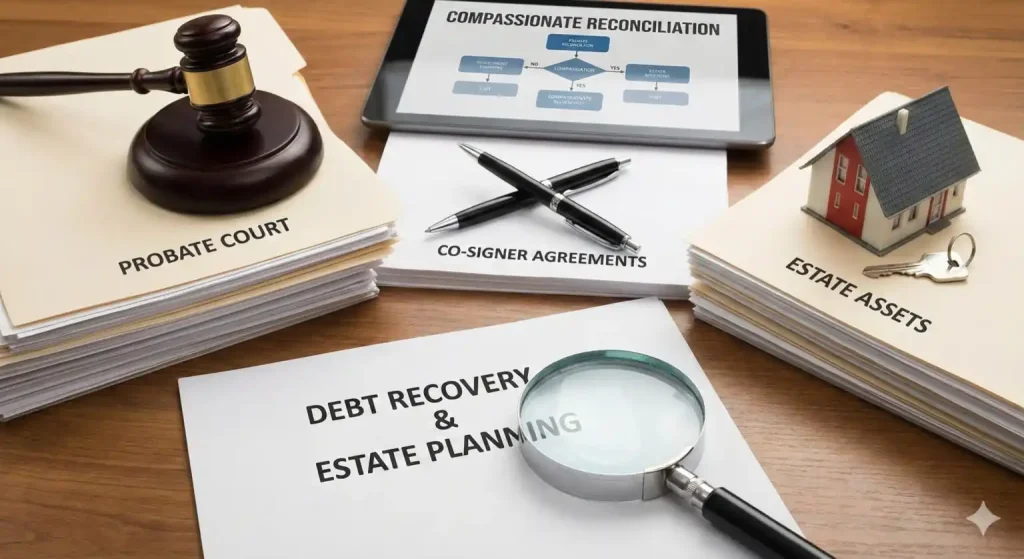When a patient or resident passes away, the transition from active care to account reconciliation is one of the most delicate phases in professional practice. For medical clinics, senior living facilities, and hospitals, the goal is twofold: recovering legitimate revenue and safeguarding a community reputation built over decades.
At Nexa, we don’t just “collect” from the deceased; we act as Account Reconciliation Concierges. Our “Velvet Hammer” approach provides the firm results your balance sheet requires, wrapped in the empathy and legal precision needed to support a grieving estate. This is the definitive guide on how to maximize recovery while acting as a “reputation shield” for your brand.
The Anatomy of Recovery: Where Estate Assets Hide
Recovery is not about pressuring a family; it is about the strategic identification of assets that are legally obligated to satisfy final debts.
1. The Probate Priority Advantage
In many states, including Texas, Illinois, and Florida, medical bills aren’t just “unsecured debt”—they are high-priority claims.
-
The Rank: Probate courts typically classify debts into “classes.” Reasonable funeral expenses and medical bills from the “last illness” often sit in Class 1 or 2.
-
The Strategy: This means you are legally entitled to be paid before credit card companies, personal loans, or even some taxes. We ensure your claim is filed correctly to maintain this pole position.
2. Non-Probate Assets: Life Insurance & Trusts
Many people believe that if an estate is “empty,” the debt is dead. This is a common misconception.
-
Life Insurance: While death benefits belong to the beneficiary, our concierges use professional mediation to work with beneficiaries who wish to fulfill the deceased’s “final wishes” or moral obligations to their care providers.
-
Transfer on Death (TOD) Deeds: Real estate often bypasses probate through TOD deeds. We track these transfers to identify equity that can satisfy outstanding balances during a property sale.
3. The Power of Co-Signers and Spouses
Liability doesn’t always vanish at the time of death.
-
Guarantors: If a family member co-signed an admission form or a surgical consent, they remain personally liable for the Current balance.
-
Community Property/Marital Assets: In states like Texas or California, the “marital community” may be liable for “necessaries” (like healthcare) incurred during the marriage.
Navigating Success Scenarios: The Velvet Hammer in Action
| Industry | Scenario | The Reconciliation Path |
| Hospitals & Medical | High-balance surgical debt from a patient with no clear estate. | Skip-trace & Asset Scrub: We identify non-probate property or life insurance and mediate with the executor to settle the claim before assets are dissipated. |
| Senior Living | Resident passes with $15,000 in unpaid care; family claims “no money.” | Small Estate Affidavit: We bypass expensive probate by filing a simplified affidavit (where state limits allow), securing payment from nominal bank accounts or vehicles. |
| Student Loans/Tuition | A student passes with housing and tuition balances. | Co-signer Recovery: We identify the guarantor (usually a parent) and use empathetic mediation to resolve the debt without damaging the school’s reputation. |
| CPA & Professional | Unpaid tax prep fees for a deceased client. | Estate Filing: We file a claim in the active probate case, ensuring the professional fee is recognized as a “cost of administration.” |
The “Estate Bridge” Metaphor: Fluidity vs. Blockage
Think of our process as an “Estate Bridge.” When a person passes, the road between their life and their heirs is blocked by the “sediment” of final debts. If an executor tries to ignore these, the bridge becomes structurally unsound and legally dangerous. We act as the engineers. We don’t use blunt demolition; we use the “Velvet Hammer” to clear the path, ensuring the estate is reconciled legally and the family can move forward without the “shadow” of an unresolved lawsuit or a lien on their inheritance.
Why the “Insolvency Scrub” is Your Best Friend
The biggest risk in deceased recovery is harassing a family that truly has nothing. This results in “review-bombing” and local PR nightmares.
-
The Protocol: Nexa performs an immediate Asset & Probate Scrub.
-
The Result: If our data shows the estate is genuinely insolvent, we advise you to write it off. This protects your 4.85-star Google rating by ensuring you never accidentally pursue a family for money that doesn’t exist.
Legal Foundations: National & State Frameworks
-
FDCPA Reg F (Rule 1006.2): We strictly communicate only with “authorized representatives”—the Executor, Administrator, or surviving spouse. This prevents third-party disclosure violations.
-
Small Estate Affidavits: In many states, if the total value is under a threshold (e.g., $150,000 in Illinois or $184,500 in California), we can recover funds without the time and cost of a full probate court proceeding.
-
Filial Responsibility Laws: In over 25 states, adult children can be held liable for a parent’s medical or nursing home debt if the parent is indigent. We use this as a Current leverage point during mediation.
Simple, Performance-Driven Pricing
At Nexa, we believe in a partnership, not a complication. For deceased account reconciliation, our contingency rate is fixed at 40%.
-
No Recovery, No Fee: If the estate is insolvent, you owe us nothing.
-
The $15 Flat-Fee Option: For very early-stage accounts where the executor is already known, pay a one-time fee of fifteen dollars and keep 100% of the recovered funds.
Frequently Asked Questions
-
How do you find out if probate is open?
We perform Current court scrubs nationally to identify estate filings the moment they occur. -
Will this hurt my reputation?
No. Our Account Reconciliation Concierges are specifically trained in grief-sensitive mediation. Our 4.85-star rating across 2,000+ reviews is proof that our style works. -
Are calls recorded?
Yes. All calls are recorded and randomly reviewed to prevent rogue behavior and protect your brand.
Contact Nexa to begin your compassionate reconciliation.

